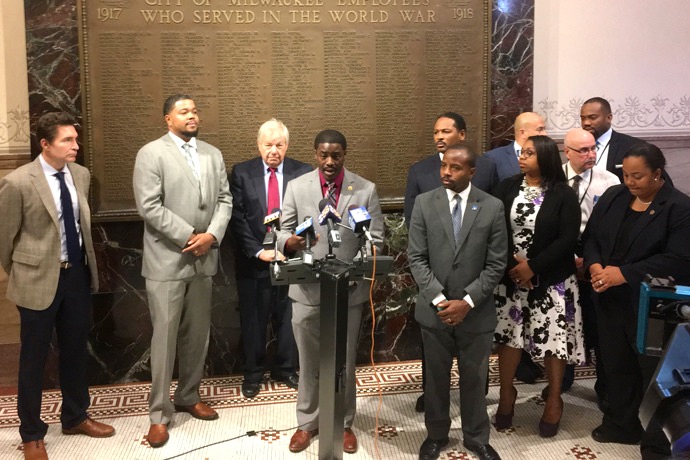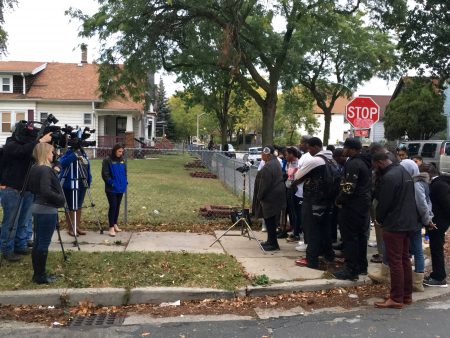Automated Technology Targets Reckless Drivers
Rep. Crowley’s bill creates pilot program in city, supported by 11 council members.

State Rep. David Crowley appears in front of 11 Milwaukee Common Council members as he introduces new legislation aimed at curbing reckless driving. Photo by Elliot Hughes.
Community leaders welcome the idea of installing automated technology throughout the city to help ticket reckless drivers, after a state lawmaker introduced legislation Tuesday to temporarily allow the practice.
State Rep. David Crowley announced his new measure, the Safe Roads Save Lives Act, at City Hall with 11 members of the Common Council appearing alongside him.
Police departments in Wisconsin are prohibited from using automated technology, such as cameras, to enforce traffic signals and speed limits. Crowley’s measure would allow the technology during a five-year pilot program in Milwaukee, where reckless driving has become a near-constant source of complaints from residents and city officials alike.

A group of about 40 community members bow their heads in prayer before beginning a news conference on Oct. 11 in the wake of the death of a 16-year-old boy from a reckless driving incident. Photo by Elliot Hughes.
“It’s about time and it’s well needed,” said Steve O’Connell, a member of the Sherman Park Neighborhood Association who has organized several demonstrations against reckless drivers.
O’Connell said he and other residents have pushed for automated technology for years but couldn’t build enough momentum to have someone challenge state law.
Crowley referenced a study by the Insurance Institute for Highway Safety that says communities with red light cameras had 21 percent fewer red light-running accidents and 14 percent fewer crashes of all kinds at signalized intersections. He said he is circulating the measure among other lawmakers for co-sponsorship.
But O’Connell and others still have some hesitation about the proposal.
When it comes to speeders, Crowley’s measure would only ticket those traveling at least 20 miles above the speed limit. O’Connell said that gives drivers “quite a bit of leeway.”
He gave Capitol Drive as an example. With a speed limit of 35 miles per hour, cars could drive up to 55 without worrying about the cameras.
“I would suggest 15, not 20,” O’Connell said.
Ian Bautista, executive director of the Clarke Square Neighborhood Initiative, also supports the legislation. He said his organization’s outreach efforts have shown that traffic safety is a top-three issue among Clarke Square residents. But he said he would be wary about how the technology is distributed throughout the city.
“I just want to make sure it’s evenly applied so that it’s not targeting certain communities over others,” Bautista said.
As of Oct. 2, there have been 47 traffic deaths in Milwaukee, compared to 57 traffic deaths in all of 2016 and 64 in 2015, according to the Milwaukee Police Department.
“It’s important that we give our police department the tools that they need to combat this growing epidemic of reckless driving,” added Crowley.
Two other community leaders, activist Andre Lee Ellis and Running Rebels Executive Director Victor Barnett, both said they support the proposed legislation, but emphasized the importance of educating the public and convincing community members to hold each other accountable.
“I see it as one of the many efforts that need to occur,” Barnett said.
Ellis organized a gathering at the corner of 12th Street and Concordia Avenue last week in response to the death of Joseph N. Blunt, 16, who was thrown from the hood of a moving vehicle at the intersection a day earlier, to ask the public to drive with care and hold each other accountable.
He said the technology would “keep the subject at the forefront of conversation, get the message out there that we have to stop and live.”
This story was originally published by Milwaukee Neighborhood News Service, where you can find other stories reporting on eighteen city neighborhoods in Milwaukee.
Political Contributions Tracker
Displaying political contributions between people mentioned in this story. Learn more.






















How long before the corruption and payoffs to rig the camera for maximum revenue generation begin like happened in Chicago? Anybody who thinks this is a good idea needs to educate themselves as to what’s happened in other places it’s been tried (and failed).
In a pilot study done in Dallas in 2007, red-light running crashes were down 60 percent and total crashes were down 30 percent on 17 of test intersections. On the other 43 intersections, after 18 months, red-light running crashes were down 39 percent and total crashes down 23 percent. (The Effectiveness of Red Light Cameras, A Texas Transportation Institute White Paper https://tti.tamu.edu/group/stsc/files/2011/03/Red-light-camera-effectiveness-070610-w-Garland-correction1.pdf)
The data is not all favorable, rear-end crashes at intersections tend to go up with the introduction of these cameras. The greater fatality rate is with the red-light running crashes, however.
As for the cameras being a tool to generate revenues, that is an entirely different issue as has much more to do with the State reduction in review sharing, which is one of the primary sources of revenue for the city of Milwaukee and the way the current legislature has tied municipalities hands when it comes to raising revenue. Solve those problems and there isn’t a need to rely on red-light running tickets as a source of revenue.
BTW there is not a source of government revenue generation that is not susceptible to corruption. That is a pretty weak argument against red-light cameras.
The devil is in the details. If you lend your vehicle to a family member or friend, will the camera images be clear enough to prevent the vehicle owner from liability, I.e. points and fines. A vehicle owner is not at fault when a cop stops your kid for speeding and hands him/her a ticket, but if the photo imagine is not clear enough to identify the driver, whose headache will it become?
@Cindy – my understanding is that other jurisdictions have treated these tickets like parking tickets – doesn’t matter who was driving, but does not impact any driver’s record either.
@Eric S – I don’t know how that can be the case. Parking tickets are ordinance violations that result in nothing but a fine whereas moving traffic violations are criminal violations of the state statutes . If the state statutes mandate points being issued because a moving violation is criminal in nature, how will vehicle owners defend themselves? Will parents want to have their licenses suspended due to high point levels because their kids drove recklessly? All of these issues need to be addressed in any legislative draft or the consequences may be worse than the problem.
I like this idea. However, by the time this passes, more people will be killed/hurt. Somehow it seems we can take the risk of someone being killed, but can’t take the risk of stopping a speeder or red lite ignorer.
Also,if someone is caught on tape speeding/ running a light,,it might put a “light” on the fact that the car is stollen, used in other crimes, etc. Could take care of multiple problems.
We seem to get deeper and deeper into we being the victims and victimized and those who ignore the law walk away.